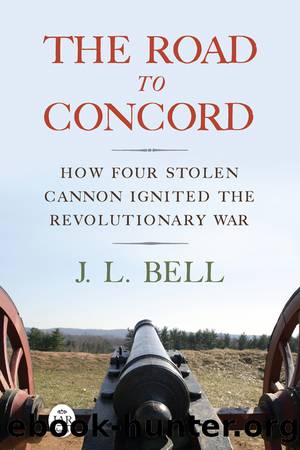The Road to Concord by Bell J. L.;

Author:Bell, J. L.; [Bell, J. L.]
Language: eng
Format: epub
Publisher: Westholme Publishing
The New England Provinces . . . are I may say in Arms, and the Question is now not whether you shall quell Disturbances in Boston, but whether those Provinces shall be conquered. From Appearances no People are more determined for a Civil War, the whole Country from hence to New York armed, training and providing Military Stores.
Instead of reporting the missing cannon, Gen. Gage had bigger ideas. To Secretary of State Dartmouth he floated the proposal of a âSuspension of the Execution of the late Actsâ that were riling up the people of Massachusetts. That would gain time to raise and land âan Army near twenty Thousand strong composed of Regulars, a large Body of good Irregulars, such as the German Huntsmen, picked Canadians, &c, and three or four Regiments of Light Horse, these exclusive of a good and sufficient Field Artillery.â
The general repeated those ideas in more letters over the following weeks, arguing more and more forcefully. On November 2 he told the Secretary of War: âThis Province and the neighboring ones, particularly Conecticut, are preparing for War; if you will resist and not yield, that Resistance should be effectual at the Beginning. If you think ten Thousand Men sufficient, send Twenty, if one Million [pounds] is thought enough, give two; you save both Blood and Treasure in the end.â
Instead of galvanizing the ministers in London, Gageâs dispatches caused them to lose faith in him. His first letter to propose suspending the Coercive Acts arrived on November 18. After reading it and other dispatches, Lord North readily agreed that âthe Province was in actual Rebellion, and must be subdued.â But âHe did not know what General Gage meant by suspending the Acts: there was no suspending an Act of Parliament.â The prime minister also doubted the governor was facing âbodies of people actually in armsâ and thus a military foe. William Knox, an undersecretary of state who outlasted multiple secretaries of state from 1770 to 1782, later wrote that the September proposals were âWhat turned us all so much against Gage.â
The moment when Gage could have reported the theft of the Boston militia cannon as part of his argument for stronger measures passed. In early winter he received cool responses to his proposals and pleasâa promise of smaller reinforcements in the spring and an insistence he should be able to quell resistance with the forces he had. The ministers in London were clearly in no mood to hear about how he had let provincials steal four field-pieces under redcoat guard. Reporting that theft now would weaken his position further and raise the question of why he did not share the news earlier. The only way Gen. Gage could avoid that embarrassment would be to retrieve the missing guns before anyone in London heard about them.
Of course, Londoners did hear some things about the arms race in Boston. On December 20, the opposition member of Parliament Edmund Burke brought up those reports in Parliament as he argued against the ministryâs American policy.
Download
This site does not store any files on its server. We only index and link to content provided by other sites. Please contact the content providers to delete copyright contents if any and email us, we'll remove relevant links or contents immediately.
| Anarchism | Communism & Socialism |
| Conservatism & Liberalism | Democracy |
| Fascism | Libertarianism |
| Nationalism | Radicalism |
| Utopian |
The Secret History by Donna Tartt(18091)
The Social Justice Warrior Handbook by Lisa De Pasquale(11944)
Thirteen Reasons Why by Jay Asher(8420)
This Is How You Lose Her by Junot Diaz(6412)
Weapons of Math Destruction by Cathy O'Neil(5803)
Zero to One by Peter Thiel(5464)
Beartown by Fredrik Backman(5312)
The Myth of the Strong Leader by Archie Brown(5219)
The Fire Next Time by James Baldwin(4998)
How Democracies Die by Steven Levitsky & Daniel Ziblatt(4943)
Promise Me, Dad by Joe Biden(4900)
Stone's Rules by Roger Stone(4836)
100 Deadly Skills by Clint Emerson(4670)
Rise and Kill First by Ronen Bergman(4537)
A Higher Loyalty: Truth, Lies, and Leadership by James Comey(4535)
The David Icke Guide to the Global Conspiracy (and how to end it) by David Icke(4363)
Secrecy World by Jake Bernstein(4360)
The Farm by Tom Rob Smith(4308)
The Doomsday Machine by Daniel Ellsberg(4234)
